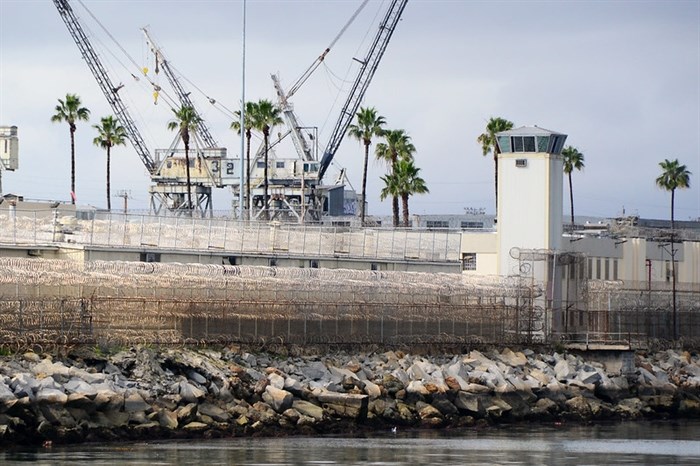
FCI Terminal Prison.
Image Credit: Flickr/Ian Abbott
October 25, 2020 - 7:00 AM
Colin Martin knows exactly how much damage can be wrought by COVID-19.
He’s had it himself and four of his friends have died from it. He’s also seen the devastation of an outbreak in a confined setting.
The Sicamous man was infected in a California prison that had the largest infection rate of inmates among federal prisons in the U.S. at the time — hundreds of cases and 10 deaths. Martin, 48, said he watched his friends die from COVID-19 and is fed up with the skepticism.
It was so bad, a federal judge sent many of the prisoners home, including Martin.
He shared his experience with COVID-19 on social media this week.
"For myself, it was extremely difficult to breathe, which ultimately (exacerbated) my already heightened anxiety level. This went on for roughly four days, and gradually tapered off," he said. "Four individuals I would characterize as friends, were not as lucky as myself, and ultimately succumbed to the effects of the virus. I have to be perfectly frank when I say this — to those of you who are treating this as a scam or this week's conspiracy theory? Give your head a shake. Your attitude is not only a complete slap in the face to those who have lost their lives to date, but also to the families these individuals have left behind."
Martin was serving a seven-year sentence at Terminal Island in San Pedro California for leading a drug-smuggling ring, using the code name Rolex, where he recruited others to fly cocaine, MDMA and marijuana across the Canada-U.S. border using helicopters, according to the Drug Enforcement Administration.
Martin called the experience with COVID-19 in the prison “a real gong show” and that he had severe pain in his lungs for months. He initially tested positive for the virus in May.
The prison set up "death tents", he said. He criticized the prison, saying known infected people and uninfected people were put together. He said the treatment of inmates was “deplorable” and that inmates were denied use of the bathroom at the hospital and were forced to use diapers that were changed by nurses once soiled.
“Once word got out that they were humiliating people with diapers, guys stopped asking for help. It was scary,” he said.
Martin said he received no help while in prison, and “I was left with a burning feeling when I took deep breaths in my lungs.”
“There isn't enough public oversight inside these facilities. Much more could be done to limit the exposure risk to inmates in circumstances like these. One initiative that would do wonders is limiting the number of inmates that are housed at a particular facility. Overcrowding still persists as the biggest contributor, to not just disease and sickness, but also instances of violence. My thoughts continue to rest with my friends I’ve left behind,” he said.
Back in May, the infection rate among inmates at Terminal Island was the highest in the nation for federal prisons. It's a low-security prison that houses 1,053 male offenders and specializes in housing inmates who need long-term medical or mental health care, according to ABC news.
According to the U.S. Federal Bureau of Prison stats, Terminal Island has seen just over 600 COVID-19 cases including both staff and inmates since the start of the pandemic, resulting in 10 deaths.
Martin's sentence was shortened by 19 months due to the pandemic after a compassionate release application was approved by Senior United States District Judge Robert Lasnik.
Martin said he was grateful to the judge and his attorney for his early release.
“I was treated very good. My family and I were certainly given an early Christmas present. Jail is a very difficult environment to live your day to day in. Throw a pandemic into the mix and you've got pandemonium,” he said.
In Martin’s compassionate release document, Judge Lasnik acknowledged that “COVID-19 has created unprecedented challenges for federal prisons, where inmate populations are large and close contact between inmates is unavoidable.”
Lasnik wrote that Martin also suffered from high blood pressure and an elevated heart rate and complained of breathing difficulties and chest pain at his recent clinical encounters, which warranted his early release. Lasnik called Martin's prior conduct "troubling" but also noted Martin has extensive family ties in B.C. including a wife and seven children and has no history of violence.
"The Court does note that the conduct for which the defendant is currently imprisoned occurred more than a decade ago," Lasnik wrote.
Martin said he has his work cut out for him, to repay the kindness shown to him through the court system by behaving and not coming back.
To contact a reporter for this story, email Carli Berry or call 250-864-7494 or email the editor. You can also submit photos, videos or news tips to the newsroom and be entered to win a monthly prize draw.
We welcome your comments and opinions on our stories but play nice. We won't censor or delete comments unless they contain off-topic statements or links, unnecessary vulgarity, false facts, spam or obviously fake profiles. If you have any concerns about what you see in comments, email the editor in the link above.
News from © iNFOnews, 2020